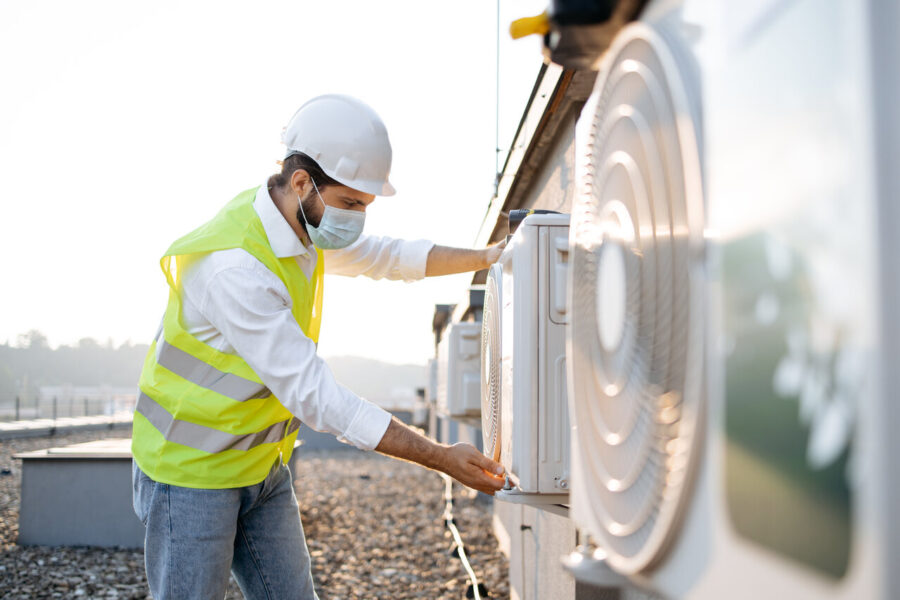As property managers, it’s our responsibility to ensure that every aspect of the properties we oversee runs smoothly and efficiently. One of the most critical systems under our watch is the HVAC system. Proper maintenance of the HVAC unit not only ensures comfortable living and working conditions but also significantly extends the life of the equipment and can substantially reduce operating costs over time.
Understanding what maintenance tasks to prioritize can be challenging, especially with the varied responsibilities we juggle daily. However, focusing on a few key areas of HVAC care can lead to significant benefits, including improved energy efficiency, reduced emergency repairs, and a longer lifespan for the system. Our goal is to provide a clear guide on how to manage these tasks effectively.
By staying proactive with regular maintenance, we can avoid the discomfort and high costs associated with breakdowns, especially during extreme weather conditions when HVAC systems are under the most strain. Let’s delve into understanding these crucial maintenance tasks and how they can be seamlessly integrated into our routine property management duties.
Regular HVAC System Inspections: Frequency and Key Focus Areas
Regular inspections are a must to keep HVAC systems in top shape. We recommend scheduling these checks at least twice a year—once in the spring before the cooling season begins and once in the fall before heating demands increase. These inspections are crucial as they help us catch issues before they turn into costly repairs. During these checks, we focus on several key areas. First, we examine the condition of the vents and ductwork for any blockages or leaks that can impair airflow and reduce system efficiency. We also test system controls and thermostats to ensure they are properly managing the indoor climate. Another important aspect is checking the refrigerant levels in air conditioning units; too much or too little can negatively impact performance.
Essential Cleaning and Upkeep Tasks for HVAC Longevity
Keeping an HVAC system clean is fundamental to its longevity. This includes regular cleaning or replacement of air filters, which should be done every 1-3 months depending on usage and environmental factors like dust and pet hair. Clogged or dirty filters make HVAC systems work harder, which can lead to overheating and eventual breakdowns. The external parts of the unit, such as coils and compressors, also require regular cleaning to remove any debris that can obstruct their functioning. We ensure these components are free from leaves, dirt, and other materials that could impede airflow and cooling efficiency. Additionally, it’s important to ensure that the space around outdoor units is clear of vegetation and debris to maintain proper air circulation. These straightforward but essential tasks significantly help in prolonging the life and efficiency of HVAC systems under our care.
Overseeing HVAC System Upgrades and Replacements
When managing properties, ensuring that the HVAC systems are not only functional but also efficient and up-to-date is crucial. Over time, HVAC components may wear down, or newer, more energy-efficient models become available. We prioritize overseeing upgrades and replacements as part of essential property management. When deciding whether to repair or replace a unit, several factors come into play. These include the age of the equipment, its overall history of repairs, and improvements in technology and energy efficiency that newer models offer.
Before proceeding with an upgrade or replacement, we conduct a thorough assessment of the existing systems. This evaluation helps us understand the specific needs and energy usage patterns of the property, ensuring that any new equipment meets these demands efficiently. By choosing the right size and type of system, we optimize operational costs and enhance comfort for tenants. Such proactive upgrades not only reduce frequent repair costs but also contribute to the property’s value.
Setting Up an Annual HVAC Maintenance Schedule
A systematic approach to HVAC maintenance goes a long way in preventing unexpected equipment failures and costly repairs. We recommend setting up an annual maintenance schedule tailored to the specific needs of each property. This schedule includes detailed tasks for each season, ensuring the HVAC system performs optimally year-round.
During the planning phase, we map out all maintenance activities, including deep cleaning, filter changes, system inspections, and performance evaluations. These are scheduled during times that minimize disruption to tenants. Keeping a regular maintenance schedule not only ensures operational efficiency but also extends the lifespan of the HVAC system. Moreover, through consistent documentation of all maintenance activities, we maintain a clear record, which is beneficial for warranty purposes and future servicing needs.
Conclusion
At Thermus Mechanical, our commitment is to provide top-notch HVAC and refrigeration services that meet and exceed the expectations of property managers in Rancho Cordova, CA. We understand the challenges you face and the importance of maintaining an efficient and reliable HVAC system. Whether it’s carrying out essential maintenance tasks, overseeing system upgrades, or setting up comprehensive maintenance schedules, our goal is to ensure your HVAC systems are in the best possible condition, providing comfort to your tenants and value to your properties.
If you’re looking to enhance the efficiency and lifespan of your commercial HVAC in Rancho Cordova, get in touch with Thermus Mechanical today. Let us help you optimize your property management efforts with professional and dependable HVAC services.


Recent Comments